FACT Files FEC Complaint Against Correct The Record PAC
- brendawebber
- May 18, 2015
- 11 min read
May 18, 2015
Federal Election Commission
Office of General Counsel
999 E Street, NW
Washington, D.C. 20463
Re: Complaint against Correct the Record PAC
Dear Counsel,
Pursuant to 52 U.S.C. § 30109(a)(1), the Foundation for Accountability and Civic Trust (FACT) submits this complaint with the Federal Election Commission (FEC or Commission) to address violations of the Federal Election Campaign Act of 1971 as amended (FECA) and Commission Regulations by Correct the Record PAC (CRT PAC), 455 Massachusetts Avenue Suite 650, Washington, DC 20001. The information contained in this complaint is based upon information and belief, statements issued by the CRT PAC, media reports, and public records. According to its own statements, CRT PAC intends to register as an independent expenditure only committee (Super PAC) or a Carey-PAC (“hybrid PAC”) and directly coordinate with presidential candidate Hillary Clinton. This type of activity is directly contrary to the FECA and Commission regulations, which provide that neither a Super PAC nor the non-contribution account of a hybrid PAC can coordinate with or make donations to federal candidates. The Commission must immediately investigate and enforce the law. See 52 U.S.C. § 30109(a)(2); 11 C.F.R. § 111.4(a).
On May 12, 2015, CTR PAC announced that, using unlimited personal and corporate contributions, it would fund a rapid response and research team to support Hillary Clinton’s candidacy in full coordination with the Clinton Campaign. Indeed, CTR PAC declares this, along with an attempted justification for its plan in its press release: “Correct The Record, though a SuperPac, will not be engaged in paid media and thus will be allowed to coordinate with campaigns and Party Committees.” CTR PAC, Press Release May 12, 2015 (Attached as Exhibit A); see also, Rebecca Ballhaus, Pro-Clinton Group Sets Novel Strategy, The Wall Street Journal, May 12, 2015 at 6:30pm (Attached as Exhibit B); Matea Gold, How A SuperPAC Plans To Coordinate Directly With Hillary Clinton’s Campaign, The Washington Post, May 12, 2015 (Attached as Exhibit C); Gabriel Debenedetti, Hillary Clinton backers defend link to PAC, Politico, May 15, 2015 (Attached as Exhibit E).
In CTR PAC’s own words:
CTR PAC’s mission is to “support [] Hillary Clinton’s candidacy for President, [by] aggressively responding to false attacks and misstatements of the Secretary’s exemplary record.” CTR PAC, Press Release May 12, 2015 (Exhibit A).
“Correct The Record is a strategic research and rapid response team designed to defend Hillary Clinton from right-wind, baseless attacks.” Id. (emphasis in original).
CTR PAC expressly describes the services it is providing or plans to provide to the Clinton Campaign as those of “a political research and communications war room.” Jennifer Epstein, Is New Hillary Clinton Super PAC Pushing Legal Boundaries?; A new group will raise big-dollar donations to help Democratic front-runner, Bloomberg Politics, May 12, 2015 at 8:28pm (Attached as Exhibit D).
“This is actually very clear cut and the FEC has repeatedly dismissed allegation regarding coordination of Internet communications,” according to Adreienne Watson, CTR PAC Communications Director. Gabriel Debenedetti, Hillary Clinton backers defend link to PAC, Politico, May 15, 2015 (Exhibit E).
Additionally, CTR PAC’s spokeswoman also stated that, despite filing with the FEC as an independent expenditure only committee, CTR PAC would make “no independent expenditures,” and as such, there were “no restrictions on its ability to coordinate with Mrs. Clinton’s campaign.” Rebecca Ballhaus, Pro-Clinton Group Sets Novel Strategy, The Wall Street Journal, May 12, 2015 at 6:30pm (Exhibit B). On Friday, May 15, CTR PAC told Politico that it would set up a “non-contribution account.” Gabriel Debenedetti, Hillary Clinton backers defend link to PAC, Politico, May 15, 2015 (Exhibit E).
It is upon these facts, further detailed below, that we allege the following violations of campaign finance law:
CTR PAC has made, or is planning to make, illegal in-kind contributions to the Clinton Campaign in the form of funding a research and rapid reaction team directly benefitting the Clinton Campaign in excess of applicable limits.
CTR PAC does not qualify as a Super PAC, and has accepted or is planning to accept contributions outside FECA’s source and amount limits and restrictions to standard non-connected, non-multicandidate, federal committees, or as a hybrid PAC that will exceed the in-kind contribution limits applicable to the contribution account or the prohibitions on in-kind contribution limits from its non-contribution account. 52 U.S.C. §§ 30116, 30118.
CTR PAC has, or is planning to make, a false certification to the Federal Election Commission in violation of 52 USC § 30109.
LEGAL AND FACTUAL ANALYSIS
I. CTR PAC’s Providing the Clinton Campaign with a Fully Funded and Coordinated Research and Rapid Response Team is an Illegal In-Kind Contribution.
By its own statements, CTR PAC acknowledges that its actions will be undertaken in full coordination with the Clinton Campaign. See CTR PAC, Press Release May 12, 2015 (Exhibit A). CTR PAC’s apparent justification for this is that because all communications issued from CTR PAC flowing from this coordinated activity will take place online, these activities fall outside the reach of the Commission’s “coordinated communications” regulations, and as such, they are beyond the scope of campaign finance regulation. Matea Gold, How A SuperPAC Plans To Coordinate Directly With Hillary Clinton’s Campaign, The Washington Post, May 12, 2015 (Exhibit C). More recently, Politico reported that “the Clinton camp’s reasons for wishing to have Correct the Record by its side as an independent group with which it can coordinate . . . takes much of the burden off of the Democratic National Committee.” Gabriel Debenedetti, Hillary Clinton backers defend link to PAC, Politico, May 15, 2015 (Exhibit E). CTR PAC’s reliance on the coordinated communications regime, however, is misplaced.
The relevant question is not whether CTR PAC engaged in a “coordinated communication” with the Clinton Campaign. Rather, the relevant question is whether CTR PAC’s funding an entire research and rapid response staff working in full coordination with the Clinton Campaign is something of value to the Clinton Campaign, and as such, constitutes an illegal in-kind contribution. It is beyond doubt that it does. CTR PAC could save space in their press releases, as there is a simpler term for a “fully coordinated research and rapid response team”—that term is “campaign staff.” As Politco reported, this “takes much of the burden off of the Democratic National Committee.” Gabriel Debenedetti, Hillary Clinton backers defend link to PAC, Politico, May 15, 2015 (Exhibit E).
By definition, political committees exist to influence a federal election and Super PACs are no different in this regard. 11 C.F.R. § 100.5. The Supreme Court in Citizens United v. FEC, the U.S. Court of Appeals for the District of Columbia in SpeechNow v. FEC, and the Commission’s Common Sense Ten Advisory Opinion established the framework within which a political committee may raise and spend funds outside FECA’s source and amount limits and prohibitions. Citizens United v. FEC, 128 S.Ct. 876 (2010); SpeechNow.org v. FEC, 599 F.3d 686 (D.C. Cir. 2010); Advisory Opinion 2010-11 (Common Sense Ten). Super PACs may do so only if (1) their expenditures are made independently of any federal candidate or party committee, and (2) they do not make either direct or in-kind contributions to any federal candidate.
Consistent with this, the Commission requires Super PACs to certify the following in order to exist:
This committee intends to make independent expenditures, and consistent with the U.S. Court of Appeals for the District of Columbia Circuit decision in SpeechNow v. FEC, it therefore intends to raise funds in unlimited amounts. This committee will not use those funds to make contributions, whether direct, in-kind, or via coordinated communications, to federal candidates or committees.
FEC Form 1, Statement of Organization—Unlimited Contributions. Nor may a presidential candidate’s principal campaign committee accept any contribution from a Super PAC, as it is prohibited from accepting contributions outside the source and amount restrictions of federal law. 52 U.S.C. § 30116. Even in the case of standard non-connected, non-multicandidate political committees (PAC), which are bound by FECA’s source and amount restrictions, candidate committees may only accept $2,700 per election in contributions, including in-kind contributions. 11 C.F.R. § 110.1. If CTR PAC is established as a hybrid PAC, its contribution account will be subject to the $2,700 per election limit, and its non-contribution account will be subject to the standard Super PAC rules.
The term “contribution” is defined in FECA to mean “any gift subscription, loan, advance, or deposit of money or anything of value made by any person for the purpose of influencing any election for Federal office.” 52 U.S.C. § 30101(8)(A)(i); see also 11 C.F.R. §§ 100.51-100.56. Included in this definition are “in-kind” contributions of goods or services offered for free or less than the usual charge. 11 C.F.R. §§ 100.52(d)(1), 100.111(e)(1); see, e.g., MUR 5366 (Tab Turner/Edwards for President) (finding in part that staff time constituted an in-kind contribution to a presidential campaign).
The term “expenditure” is defined in FECA to mean “any purchase, payment, distribution, loan, advance, deposit, or gift of money or anything of value, made by any person for the purpose of influencing any election for federal office.” 52 U.S.C. § 30101(9)(A)(i); see also 11 C.F.R. §§ 100.110–100.114.
The FEC concluded in MUR 5366 that the FEC’s “investigation … show[ed] that from February through April 2003, [Turner’s law firm Administrator], acting on Turner’s instructions, served as a de facto campaign employee, with her salary being paid by Turner & Associates.” MUR 5366, General Counsel’s Report #4, 20.
The Commission has dealt with similar questions before. In MUR 5366 the Commission reached settlements with Tab Turner and the John Edwards’ presidential campaign which included violations for use of a law firm’s staff to plan a fundraiser. This matter did not involve any coordinated communications under 11 C.F.R. § 109.21. Rather, the Commission concluded that the use of corporate staff time to coordinate activities with a campaign constituted a direct and impermissible in-kind contribution to the campaign.
We also draw the Commission’s attention to case of United States v. Harber (E.D.V.A. 1:14-cr-00373, filed November 6, 2014) where the Department of Justice is proceeding to sentencing in June of 2015 after a criminal guilty plea by a congressional campaign manager who coordinated spending with a Super PAC. The criminal information in that case focused on the making of “expenditure contributions” and did not tie the criminal activity to any specific public communication that would have met the coordinated communication definitions found at 11 C.F.R. § 109.21.
CTR PAC is a political committee that has stated it exists to support Hillary Clinton’s candidacy. CTR PAC is planning to provide the Clinton Campaign with a “rapid response and research team” that functions in close coordination with the Clinton Campaign. Based on published reports and their own statements, CTR PAC’s services to the Clinton Campaign include, but are not limited to, personnel, equipment, research, and other tangible products produced and shared with the campaign, as well as office space.
There is no requirement, as CTR PAC seems to assert, that an expenditure be tied to a “coordinated communication” before it may become an in-kind contribution. There is no “exemption” as CTR PAC asserts in the face of the clear text of the regulation, for compensated internet activity and the provision of staff by a Super PAC or hybrid PAC to a candidate committee. 11 C.F.R. § 100.94. For CTR PAC to claim, as it must, that funding the Clinton Campaign’s research and rapid response team provides nothing of value to the Clinton Campaign is absurd. Under CTR PAC’s logic, a corporation would be allowed to give a campaign fully coordinated use of its in-house research and communications team, so long as whatever that staff did was distributed online. Put differently, CTR PAC reasons that MUR 5366 and the definition of direct in-kind contribution do not exist.
The sheer ridiculousness of this position is illustrated by none other than Brad Woodhouse, CTR PAC’s President. Mr. Woodhouse just filed a complaint against HarperCollins Publishers and the author of Clinton Cash for simply providing a briefing to a Senator serving on the Senate Foreign Relations Committee about the content of the author’s book about foreign governments donating vast amounts to the Clinton Foundation while Hillary Clinton served as Secretary of State. See ADLF Files Complaint on Potential Paul Violation of Federal Law, American Democracy Legal Fund Press Release, May 12, 2015, available at http://americandemocracy.org/adlf-files-complaint-on-potential-paul-violation-of-federal-law/.
Mr. Woodhouse argues—in writing and sworn before the FEC—that simply providing an exclusive briefing about a book that is published and generally for sale to the public constitutes an illegal in-kind contribution. But he now argues that providing fully coordinated campaign research and rapid response services to a candidate is not an in-kind contribution, and is wholly legal under the law when funded by a Super PAC or hybrid PAC.
Neither CTR PAC’s scattered public justifications for this scheme nor Mr. Woodhouse’s compounding absurdity with absurdity, however, change the fact that CTR PAC’s coordinated support for the Clinton Campaign constitutes a prohibited in-kind contribution to the Clinton Campaign, regardless of whether CTR PAC is a Super PAC prohibited from contributing or a hybrid PAC prohibited from contributing more than $2,700 from the contribution account or any amount from the independent expenditure account.
II. Correct the Record does not qualify as a Super PAC and has, or is planning to, accept illegal contributions.
CTR PAC publicly stated that it will make “no independent expenditures.” CTR PAC, Press Release May 12, 2015 (Exhibit A). Instead, it will be making expenditures in full coordination with the Clinton Campaign. In accordance with the FECA and applicable regulations, a political committee that coordinates activities with candidate committees and makes in-kind contributions is not a Super PAC, but rather is a traditional PAC subject to the $5,000 per calendar year per individual limit on contributions to the PAC. 11 C.F.R. § 110.1. Such committees are also prohibited from accepting corporate contributions. 52 U.S.C. § 30118.
Further, as a non-multicandidate PAC, CTR PAC is prohibited from making a contribution in excess of $2,700 per election to a federal candidate. 52 U.S.C. § 30116; 11 C.F.R. § 110.2. Even if CTR PAC forms as a hybrid PAC and makes these expenditures out of its contribution account only, the staff and vendor expenses will quickly exceed the permissible $2,700 limit.
CTR PAC has publicly announced its plans to violate both FECA’s limits and prohibitions on contributions it may accept, as well as the limits on contributions it may make to federal candidates.
III. Correct the Record has or is planning to make a false certification to the Federal Election Commission.
Pursuant to 52 U.S.C. § 30109, providing false information to the Commission is a violation of law. It appears that CTR PAC intends to certify to the Commission that it is a Super PAC operating pursuant to SpeechNow, and that it will make only independent expenditures and refrain from making direct or in-kind contributions to candidates and candidate committees. Instead, while CTR PAC appears intent on submitting this certification, its whole purpose for existence appears to be the provision of direct in-kind contributions to a single candidate committee using funds raised in unlimited amounts from individuals and corporations. Regardless, CTR PAC’s public statements regarding its operations directly contradict the certification it has or will soon file. Even if CTR PAC files as a hybrid PAC, this certification is no going to be honored with respect to the non-contribution account. This appears to be in direct violation of the FECA, and it appears that CTR PAC intends to knowingly and willfully violate the required certification.
CONCLUSION
These facts indicate that CTR PAC intends to knowingly and willfully engage in a plan to evade the limits, prohibitions and reporting requirements of the FECA. A Super PAC or hybrid PAC cannot be permitted to make unlimited in-kind donations to a candidate.
If this type of behavior were permitted, the rule prohibiting Super PACs from donating to candidates or hybrid PACs exceeding the applicable contribution limits would be eviscerated, and corporate entities, Super PACs and hybrid PACs would provide directly to candidates and their committee staff and consultants with the exception only of those who provide paid media services. This would essentially eliminate all limitations on contributions to candidates except for the purposes of purchasing paid media advertisements. There is no justification for this scheme that passes the laugh test; CTR PAC and the Clinton Campaign are proceeding for no reason other than brazen confidence that no one will enforce the law and hold them to account.
CTR PAC’s own statements and media reports identify evidence that CTR PAC is planning to make in-kind contributions from funds raised without limits from individuals and corporations on a scale not seen since prior to the adoption of the FECA. Based on all of this information, there is reason to believe CTR PAC has not and will not comply with the FECA’s prohibitions on donations to candidates outside of the limitations and prohibitions of the FECA.
The Commission should conduct an immediate and thorough investigation into these allegations to determine if a massive violation of the FECA is about to occur. If it should find that these violations of the FECA are in fact about to happen, the Commission should take immediate legal actions to enjoin such a massive violations of the Act, and the Commission must then hold the Respondents accountable.










































Comments